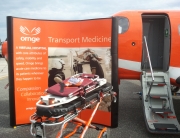I’ve dreamed of it. I’ve worked all my life for it. I’ve sacrificed for it, I’ve loved it, I’ve WANTED it. And now I have it.
Let me introduce myself: J.D.M, Professional Pilot.
Greek mythology tells of a young man who, like you and me, once dreamed of flying – Icarus. His dream was so passionate, his love for the sky so intense, that he did everything he could to reach his goal: fly amongst the birds and the clouds.
But, as he took flight, exhilarated by this intoxicating sensation we all know oh-so-well, he let his passion take over. Higher and higher he soared, forgetting all but his mesmerized admiration for the sun. Some will argue he lacked knowledge and experience – but his father finished the trip, no? – some will say he simply let his heart take over. And, while following his heart and his dream certainly led him to accomplish this wondrous odyssey to the sky, it also led him to his demise after the wax holding his wings together melted when he got too close to the sun.
There are definitely a few lessons to be learned from Icarus’ story and tragic demise. Like many of us, modern pilots, Icarus was stricken by the incurable passion and desire for flight. And like many of us, he sacrificed many things to accomplish his dream – ultimately forfeiting his own life for the privilege of flight.
Fast forward a few thousand years ahead. Just like Icarus, you find yourself with an unshakeable love for flying. You want it, you yearn for it. But what will it take for you to go from simple pedestrian to mythological being? Let’s review the requirements needed in today’s modern economy to become a professional pilot and what sort of skills you will need to acquire in order to make yourself marketable to major airlines – without sacrificing your life (figuratively).
Networking
We all know this quote – the quintessential backbone of any industry. However, I will need to add an important truth to this age-old statement: It’s not what you know, not who you know, but who knows you! From the very start, even before you begin you training, every single connection you make could have an impact on your career.
The very first steps in starting or strengthening your career in aviation should be the three aspects of networking: Socializing, Mentoring, Public Forums.
Socializing.
Another word for it could be mingling. It requires some time and effort, but is immensely rewarding in terms of networking with new faces and making your name known in the global aviation community. There are many resources made available where one can easily connect with pilots and other aviation personnel. Sir Arthur Conan Doyle – the author of the famous Sherlock Holmes novels – himself states: “Skill is fine, and genius is splendid, but the right contacts are more valuable than either.”
The first and most powerful tool is definitly Twitter. Using hashtags such as #aviation, #flyling, #pilot, #avgeek, you will be sure to meet many new faces from all around the globe – all with the same passion and love for aviation in all its forms! Once/if you have a Twitter account, I also recommend using a tool such as TweetDeck to facilitate your experience. Just in case you wonder about the social network sizes and traffic, check out this very recent and accurate graph.
As you can see, other venues can and should definitly be used as well, such as the new Google+ and Facebook. The golden rule of networking in aviation is: Never burn bridges. It is an extremely small community relatively speaking, and what goes around comes around.
Mentoring.
Pilots share camaraderie unlike many other occupations. A mentor will guide, counsel, advise and coach you and likely become a close friend. Wether you meet your mentor through networking or as a result of a friendship with a pilot you already know, he or she will be key to your success in aviation. Often times, a mentor will be a pilot already working for an airline or a well-respected institution, able to influence your path, training and involvement to a certain extent. To get a better idea, here is a short video describing the concept:
If you do not know a pilot yet and would like to connect with professionals in the industry who love to coach and help new pilots, don’t panic! You can get started by visiting some websites such as Aviation Connection, Airline Pilot Mentor , the AOPA “Give it Back” program or ATP Flight School Pilot Career Coach page.
Public Forums
Last but not least, public forums are a great source of information about the latest developments in aviation, as well as an infinite trove of technical information for all calibers. Some also specialize on job listings for pilots. To name but a few:
International
Professional Pilot Rumor Network
Airline Pilot Central Forums
Pilot Career Center
CoffeeLovesMilk
ClimbTo350
FindAPilot.com
Canadian
Avcanada
Aviation.ca
Technical Skills
I have recently read many questions from aspiring pilots all coming back to the same one theme: University Degree v.s. Immediate Career start.
Although there are technically no right or wrong answer, let’s consider the options more in detail, as well as the other technical experience and training airlines and flight operations look for when hiring – flight time and experience on type.
Technical Education & Training
Acquiring a pilot’s liscence can take anywhere between months to years, depending on your available time and resources, as well as the path chosen. There has been a lot of debates lately about the usefulness of a non-related university degree for professional pilots and if/when it should be taken in the course of a career.
The main trend remains what most people would consider the “obvious” path. Find a local flight school, acquire flight training and flight time. 250 hours later, with a commercial pilot liscence and probably a multi-engine rating in hand – start the job hunting. While this “no-brainer” option has the advantage of putting you on the job market in the shortest possible time span, it also severely limits your ability to acquire higher-end jobs and puts you at disadvantage compared to more skilled or educated competitors. You will quickly find yourself wanting for more advanced training which will allow you advancement or promotion.
So what then? I would definitly recommend getting a college/university degree to complete your professional education. There are two ways to do this, and while both have a lot of merit, let’s explore the pro’s and con’s of each.
Stand-Alone University Degree. This option gives you the chance to expand your skill base and acquire very useful knowledge that might help you advance within your airline or company in more than just a flying function. A Business, Marketing, or Human Resources Degree will definitely enhance your career path by allowing you to be of use to your employer in a different way than a ”simple” pilot qualification. There are also aviation-oriented degrees that will push the boundaries of marketing or engineering into the flying realm if you seek to further your comprehension of the industry. A university degree also gives you a very solid contingency plan in case things go sour and you find yourself back on the solid ground for good.
Another part of this is not always obvious, especially to new or younger pilots. As you progress in your aviation career you fill find that, despite your unquenchable love for flying, you will yearn for more challenges when the aircrafts hold no more secrets for you. Most airline pilots find their job becoming more of a ”hobby” and try to find new ventures or adventures outside of the cockpit. This is where a non-aviation related education will help you accomodate this need.
The question that remains is: What about Timing? Experts (ok -Professional Pilots in the industry) often recommend acquiring your university degree before entering the job market. Once you find a job and start working, the constant need for flight time and experience will preclude you from fully immersing in your studies and limit you to a part time (at best) educational schedule. Some pilots never go back to school and often find themselves at the bottom of the totem pole when comes the time for advancement to a management position or other.
The main drawback of this option resides in the amount of time and monetary resources required. Doing your pilot training and a university degree two separate ways will cost you an extra year or so, as well as additional costs related to both venues.
Integrated Aviation Degree. The best of both worlds remains the integrated Aviation Degree. Many schools across North America offer 3-4 years programs where you can earn your wings along with a university degree. It is the favorite one for recruiters as they know a few things about your education and skills from the get-go: as a graduate from an integrated aviation degree, you will have earned not only the required knowledge to manage their airplanes, but also a broader spectrum of skills related to the industry (engineering, crew resource management, outdoors survival, communications, computers & electronics, etc).
As a graduate from such a program myself, I can only vouch for its credibility, its usefulness and above all – it’s value. My school, like many others offering the same programs, maintains links with airlines and other industry venues. This opens an incredible amount of doors to the graduates as they make their way out of the shool’s doors onto the professional job market. Your school’s recognition will weigh heavily in the balance at some point in your career, and you will find more and more companies recognize the value of your education. One extremely important part of the education you will receive with such a degree will be Crew Resource Management. Two-Crew operations is compulsory for any airlines and even smaller operators who chose it. CRM teaches you the basic abilities needed to deal with your crew in this environment, and utilize the resources available wisely and skillfuly.
Aside from the many educational benefits of this option, pilots-in-training also find their careers fast-tracked to the cockpits of commercial operators due to the shorter time required to acquire the necessary education and training. It saves you money (although some flight colleges are pretty onerous). Some programs even offer you the opportunity to acquire your flight instructor rating and work for them in order to gain flight time and experience. Many also offer time in advanced simulators and type ratings on different jets.
The one downside you will find following this route however resides in the usually very focused education. Once again, reaching a point further down in your career, you might start looking into different challenges and options, which will most likely require more training and/or a different level of education. While some companies offer assistance and financial aid to employees wishing to further their education, it remains an extra cost and financial strain that pilots cannot always afford.
Life Skills
Irene Becker, the Chief Success Officer at Just Coach It mentions in her list of 10 Powerful Steps for a Thriving Organization:
A global marketplace, a war for talent, and a diverse workforce all demand a new perspective that will allow you to understand and successfully negotiate the cultural and ethnic differences that can deride communication, effectiveness, engagement, action-ability and results.
Becker also mentions EQ – or Emotional Intelligence – as part of the success tools needed by any organization. Before I go any further, here is a quick definition to help you understand the concept:
“Emotional Intelligence is a way of recognizing, understanding, and choosing how we think, feel, and act. It shapes our interactions with others and our understanding of ourselves. It defines how and what we learn; it allows us to set priorities; it determines the majority of our daily actions. Research suggests it is responsible for as much as 80% of the “success” in our lives.” (From Handle With Care: Emotional Intelligence Activity Book, Freedman et al.)
Companies can continue to give top priority to financial performance — but many now also realize that technical and intellectual skills are only part of the equation for success. A growing number of organizations are now convinced that people’s ability to understand and to manage their emotions improves their performance, their collaboration with colleagues, and their interaction with customers. After decades of businesses seeing “hard stuff” and “soft stuff” as separate domains, emotional competence may now be a way to close that breach and to produce a unified view of workplace performance (FastCompany.com)
The link between Aviation and EQ is very clear. The ability to understand and identify problematic emotions, deal with co-workers and safely achieve performance is a must to every operation. Although EQ is not always called that way during an airline or job interview, it will often times take the form of a test, which the candidate will have to fill up during the process. It will give your would-be employer a very good idea of your ability to cope with stress, change, coworkers and managers on a daily basis. It is thus crucial for you, as a candidate, to know your strenghts and weaknesses, know how to address them, describe them, and enhance your reactions if need be.
There are five basic competencies that comprise the field of Emotional Intelligence. The first three are Intra-personal: they are invisible to others and occur inside of us. The last two are inter-personal: they occur between us and other people and are observable in our behavior. The better developed your intra-personal skills, the easier it is to demonstrate your inter-personal skills. (Source: byronstock.com)
- Emotional Self-Awareness – Having the skill to focus your attention on your emotional state – being aware, in-the-moment, of what you’re feeling. Are you happy, excited, worried, or angry? Given that information about your emotional state, what should (or shouldn’t) you do or say next? Use that information to help you make effective decisions to achieve better outcomes for yourself and others.
- Emotional Self-Regulation – Having the skill to be able to choose the emotions you want to experience, rather than being the victim of whatever emotions occur – not letting others “push your buttons.” It is about possessing the ability to manage your emotional state. Do not confuse this with “burying” or “stuffing” your feelings. The skill to choose the emotions you want – typically to be able to transform negative draining emotional states into positive productive ones.
- Emotional Self-Motivation – The ability to use your emotions to cause yourself to take positive action to continue to persistently pursue goals even in the face of significant adversity or difficulty. This is about using your emotions to be positive, optimistic, confident, and persistent rather than negative, pessimistic and second-guessing yourself and your decisions.
- Empathy – Not to be confused with sympathy – possessing the ability to listen effectively and accurately enough to put yourself in the other person’s shoes. This is not necessarily to agree with them, but to truly understand the situation from their point-of-view in order to improve communication, problemsolving, and trust.
- Nurturing Relationships – The ability to demonstrate sincere care (as contrasted with “required courtesy”) for others. Through word and deed, demonstrate appreciation for people’s efforts and contribution. This is about setting a positive tone of cooperation no matter how difficult the situation or conversation and having other’s best interests in mind while focusing on achieving goals to create win-win outcomes.
In addition to boosting your team-work, performance and CRM abilities, these skills will also help you develop, achieve and maintain an outstanding work ethic which will be invaluable to your employer. To put it in perspective, here is a story shared by the CEO of DB-Air, a charter operator in Ontario:
“Recently a candidate applied for a First Officer position at DB-Air. As I am often busy at the company’s hangars myself supervising and taking care of details, I offered to meet him there. He arrived shortly before our set appointment, and found me changing tires on the company’s car. After introducing himself, he immediatly offered to help me with the chore, despite the grease and potential for getting his business atire dirty. As far as I knew, the interview was already over. I knew on the spot I wanted him to work for me.”
I believe this story trully illustrates the importance of cultivating and demonstrating an outstanding work and life ethic – one that will seperate you from the crowd of qualified and educated candidates and put you in the “demonstrated excellence and initiative” category. More than ever, it is vital for employees (as well as employers) to be able to share innovation, passion and collaboration. And these skills do not come bundled in a curriculum.
Life skills will not only greatly enhance your ability to cope with the ever so demanding technical requirements of the modern world of aviation, but also give you the ability to work as a team with different crews, solve problems, take the lead when needed and more.
As stated by a Virgin Airlines long-standing employee: Personality and people skills are an absolute must in this industry I feel. Being a team player at entry level is also a must , later showing leadership skills. Being approachable , being able to listen, being compassionate , understanding , being able to operate in every sense of the word under pressure. Being open to diversity , differences in people and cultures.
Do YOU have what it takes to be a Professional Pilot?
*******************
Thank you in advance for any comments or ideas you would like to share. I will answer them in the shortest delays! I truly hope you enjoyed this article as much as I enjoyed writing it – and that it may, in some little way, help you find your way to your dreams!









Fabulous piece! Amazing how EQ plays such a pivotal role in so many industries. Although not a pilot, or aspiring to be one, I can see this as a great resource and conversation starter for not only those who aspire to be a pilot but also those already entrenched in their passion. Keep it up. Your knowledge and experience will benefit many!
Thank you so much April! EQ is indeed everywhere and can have profound impacts on daily operations of an airline. I’m still learning, but I think many could benefit from a more advanced review of EQ’s elements and influences on their performance and team work.
Jean Denis, you earn a standing ovation for this awesome article! I applaud you on sharing your heartfelt passion paired with such important best practice details/information not only about becoming a pilot and being a pilot but also the industry at large.
I am so grateful Twitter/our mutual adored April A. introduced us~ 🙂 This is one great example of how social media networking unites people equally passionate about our awesome aviation industry. 🙂
Your writing is a true gift for others so please forge ahead and keep writing. 🙂 With friendship and gratitude, Steph~
Steph – you honor me with such kind words! I am also grateful every day for the friendships I’ve made and the people I’ve met through various connections. You and our mutualy adored April A make aviation what it’s truly meant to be – a community of friends and professionals helping each other by creating a better world every day!
I will keep writing, if only for the pleasure of reading your comments again 🙂
Much love and gratitude to you as well!
So brilliantly written ! This is a wonderful example of how all airlines should base their recruitment process for most roles. This industry is a small world yet I’ve had the privilege of interacting with Jean thanks to twitter .. And in my humble opinion , as a cabincrew member I would be honoured to have a pilot such as Jean as part of my crew. He is without a shadow of a doubt a natural born team player and team leader. Crew resource management expert . Loved the article. Regards Jason
Jason, you truly know how to flatter a pilot 😉 Some leaders are made, some leaders are born as such, but either way there is always room for improvement and learning – and I hope that this humble post might help other aviation leaders in the making.
A cockpit must have a chain of command – Captain & FO – but it is also a crucial symbiotic relationship where all the members of the team (including management, dispatch, cabin crew) have a part to play. As more pilots are trained to enter the job market in the years to come, it is my hope that they will be trained not only to perform to an established technical standard, but also to demonstrate core character qualities and strengths which will really make a difference for their employers and their clients.
Until we meet in the air.. Take care! 🙂
Jason, you truly know how to flatter a pilot 😉 Some leaders are made, some leaders are born as such, but either way there is always room for improvement and learning – and I hope that this humble post might help other aviation leaders in the making.
A cockpit must have a chain of command – Captain & FO – but it is also a crucial symbiotic relationship where all the members of the team (including management, dispatch, cabin crew) have a part to play. As more pilots are trained to enter the job market in the years to come, it is my hope that they will be trained not only to perform to an established technical standard, but also to demonstrate core character qualities and strengths which will really make a difference for their employers and their clients.
Until we meet in the air.. Take care! 🙂
Hi Jean, this is an excellent article. One thing that I need to share with your readers in the view on social media from the big airlines. As you know, I’ve recently de-identified myself with my company. The reason is, they don’t want their employees out speaking about “anything” because if the media picks it they are labeled as a spokes person for the airline. Companies are very sensitive. I think that keeping a low profile until you get that job might be the better way to go. Because is a company sees that you are huge success on the social media platform, they know you won’t drop it to come and work for them. They’ll be afraid. Also, I’ve learned with so much social media.. that takes time. Time that could be used studying, learning, etc.
The best part of twitter and facebook is connecting with great people like yourself. So we can all help each other, and help other pilots achieve their dreams. The connections are great. And, a great place to learn about what’s going on in the industry.
Social media and airlines have opened up a whole new world for sure.
Thanks again for a great post!
Hi Karlene,
Thank you for this GREAT comment 🙂 I completely agree with you about the social media part of the article. It takes a lot of time and efforts, out of time that could and maybe sometimes should be used to better ends. It’s a question of striking a balance and learning what you can spare.
As for the social media and company affiliation, I also agree. As you might have noticed, I removed the banner at the top of my page with my company’s airplane and put my own personal one. I’ve also been through the same process to ensure that my employer’s name is not associated with any mistake I might make while I learn and write my thoughts down here to share. Once again, I can only but nod in approval to your very wise words and comments.
Thank you again Karlene for sharing this with me 🙂
Hi Karlene,
Thank you for this GREAT comment 🙂 I completely agree with you about the social media part of the article. It takes a lot of time and efforts, out of time that could and maybe sometimes should be used to better ends. It’s a question of striking a balance and learning what you can spare.
As for the social media and company affiliation, I also agree. As you might have noticed, I removed the banner at the top of my page with my company’s airplane and put my own personal one. I’ve also been through the same process to ensure that my employer’s name is not associated with any mistake I might make while I learn and write my thoughts down here to share. Once again, I can only but nod in approval to your very wise words and comments.
Thank you again Karlene for sharing this with me 🙂
Thanks Jean… I did notice the banner gone. Social media and our companies is such a fine line. While we are being positive representatives for our companies, we know that the media can pull a line or two out of context and then make it not what we said… then the company in attached to that statement. Keep up the great posts!!
Thanks Jean… I did notice the banner gone. Social media and our companies is such a fine line. While we are being positive representatives for our companies, we know that the media can pull a line or two out of context and then make it not what we said… then the company in attached to that statement. Keep up the great posts!!
An impressive share! I’ve just forwarded this onto a colleague who was doing a little homework on this. And he in fact ordered me lunch simply because I stumbled upon it for him… lol. So let me reword this…. Thank YOU for the meal!! But yeah, thanx for spending some time to talk about this subject here on your internet site.
Glad to hear I helped… in some little way 🙂 Have a wonderful holiday season!
An impressive share! I’ve just forwarded this onto a colleague who was doing a little homework on this. And he in fact ordered me lunch simply because I stumbled upon it for him… lol. So let me reword this…. Thank YOU for the meal!! But yeah, thanx for spending some time to talk about this subject here on your internet site.